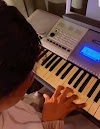**Why Most Piano Teachers Are Wrong: The Unconventional Method That Will Make You a Pro in Half the Time**
Are you tired of the same old piano lessons that seem to drag on forever without yielding the results you desire? Do you feel like you're practicing for hours without making significant progress? It might be because most traditional piano teaching methods are fundamentally flawed. In this article, we're going to challenge the conventional wisdom and introduce an unconventional approach that can skyrocket your piano skills in half the time.
### The Problem with Traditional Piano Teaching
1. **Rigid Structure and Repetition**: Most piano lessons follow a rigid structure, emphasizing scales, arpeggios, and classical pieces. While these are important, they can be monotonous and demotivating for many students. This repetitive approach often leads to burnout and frustration.
2. **Lack of Personalization**: Traditional teaching methods often fail to consider individual learning styles and preferences. What works for one student may not work for another, yet many teachers use a one-size-fits-all approach.
3. **Emphasis on Reading Over Playing**: Many teachers prioritize reading sheet music over actual playing. While sight-reading is a valuable skill, it can be a barrier to enjoying the instrument for beginners who just want to make music.
### The Unconventional Method
So, what's the alternative? Here's a method that flips traditional teaching on its head and promises faster, more enjoyable learning.
1. **Learn Through Songs**: Instead of starting with scales and theory, begin with songs you love. This approach keeps you motivated and engaged. By playing music you enjoy, you'll naturally want to practice more, and you'll learn techniques and theory in context.
2. **Use Technology and Apps**: Leverage modern technology to aid your learning. Apps like Simply Piano or Synthesia provide interactive and immediate feedback, making practice sessions more engaging and effective.
3. **Focus on Improvisation and Creativity**: Encourage improvisation from the start. This develops your ear and understanding of music far better than rote memorization. You'll learn to express yourself and understand music on a deeper level.
4. **Peer Learning and Collaboration**: Join a community of learners. Online forums, social media groups, and local meet-ups like Vicpiano can provide support, inspiration, and feedback. Learning from and with others can be incredibly motivating.
5. **Break the Rules**: Don’t be afraid to experiment and break the rules. Music is an art form, and strict adherence to rules can stifle creativity. Find what works for you and run with it.
### Real-World Success Stories
Consider the success stories of self-taught musicians who have achieved incredible proficiency through unconventional methods. Artists like @vicpiano , Ray Charles and Stevie Wonder developed their unique styles by playing by ear and focusing on creativity and expression rather than formal training.
### Conclusion: A Call to Action
It's time to rethink how we learn piano. The traditional methods may work for some, but they’re not the only path to proficiency. By embracing an unconventional approach, you can become a skilled pianist faster and with more joy.
What do you think? Have traditional piano lessons worked for you, or do you think there's merit to this unconventional method? Share your thoughts and experiences in the comments below!









0 Comments